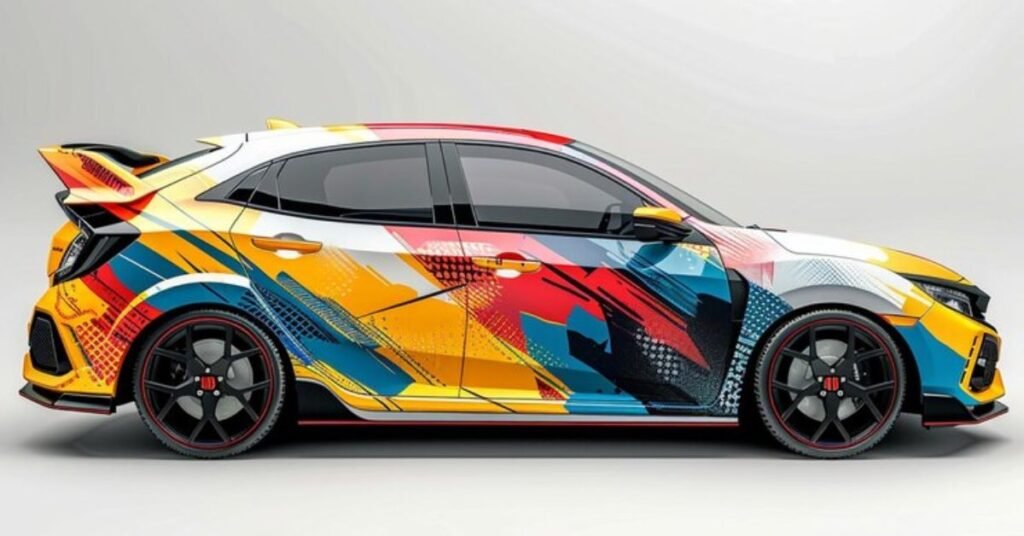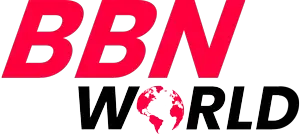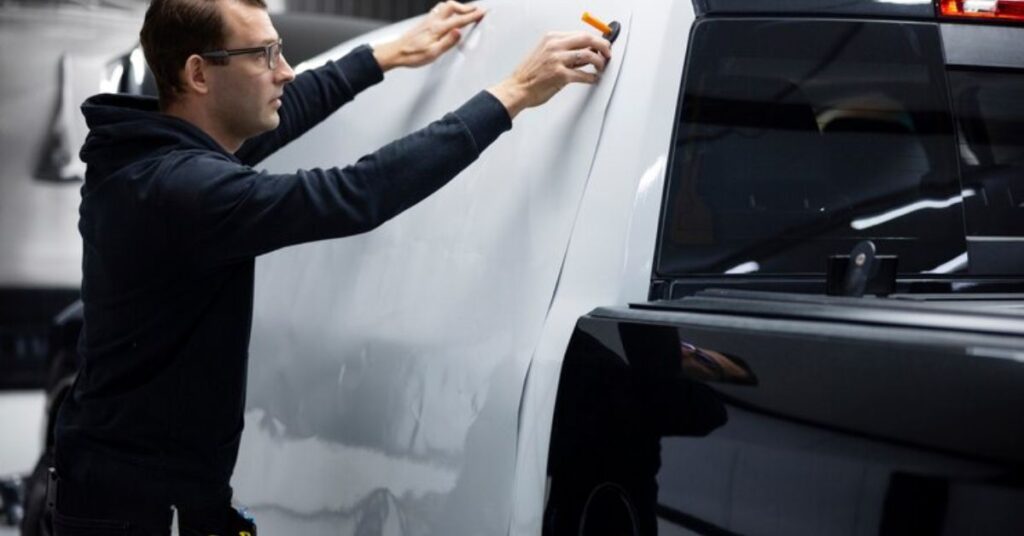Introduction
Car wrapping have gained immense popularity as a cost-effective way to change a vehicle’s appearance without a permanent commitment. Whether for personal customization or commercial branding, car wrapping offers a wide range of possibilities. But the most common question asked is: How much does it cost to wrap a car?
The answer varies based on several factors, including the size of the vehicle, type of vinyl, complexity of the design, and geographic location. In this detailed guide, we will explore all aspects of car wrapping, including its benefits, types, real-world applications, and challenges.
What is Car Wrapping?
Car wrapping is the process of covering a vehicle’s exterior with a vinyl film that comes in different finishes, colors, and designs. This method allows for complete customization without altering the original paint. Wrapping has become a preferred option for those looking to update their vehicle’s look, protect the original paint, or advertise a business.
Key Concepts of Car Wrapping:
- Full vs. Partial Wraps: A full wrap covers the entire surface, while a partial wrap targets specific areas.
- Vinyl Film: The material used, available in various textures like matte, gloss, satin, chrome, and carbon fiber.
- Durability: Most high-quality wraps last between 3 to 7 years with proper maintenance.
Car wrapping provides an effective, temporary solution for changing a vehicle’s appearance or adding branding elements.
Factors That Affect the Cost of Wrapping a Car
The cost to wrap a car depends on several key factors. Understanding these elements will help you make an informed decision and estimate the potential cost.
1. Vehicle Size
The size of your vehicle plays a significant role in determining the overall cost. A larger surface area requires more vinyl material and additional labor, which increases the price.
- Compact Cars: These are the least expensive to wrap due to their smaller size.
- Sedans: Mid-sized vehicles fall into the mid-range price category.
- SUVs and Trucks: Larger vehicles like SUVs, trucks, and vans are more expensive to wrap because of the extra material and time needed.
2. Type of Vinyl
Vinyl comes in various types and finishes, each impacting the cost of the wrap.
- Gloss and Matte Finishes: These are often the most affordable options.
- Satin and Metallic Finishes: These mid-tier finishes offer more texture and shine but come at a higher price.
- Chrome and Carbon Fiber Finishes: These are the most expensive options due to their advanced materials and eye-catching appearance.
3. Customization
Custom designs, logos, or graphics will significantly increase the price of wrapping a car. A complex design often requires more detailed work and specialized skills, which raises both labor and material costs.
- Solid Color Changes: A simple color change is the most affordable customization.
- Multi-Color or Gradient Wraps: These require more material and time, raising the overall price.
- Custom Graphics: Business logos, decals, or intricate patterns add to the cost, as they require detailed design and installation.
4. Labor Costs
Professional installation ensures a smooth, high-quality finish, but it comes at a price. The experience and expertise of the installer will directly influence the cost.
- Professional Installation: Guarantees longevity and durability but increases the cost.
- DIY Installation: While cheaper, DIY wrapping can lead to bubbles, wrinkles, or improper alignment, which might result in additional expenses to fix mistakes.
5. Geographic Location
Where you get the car wrapped also impacts the overall price. Urban areas or regions with a high cost of living tend to have more expensive labor rates.
- Urban Areas: Expect to pay more in larger cities or regions with higher demand.
- Rural Areas: These areas may offer more affordable rates but might have limited availability of specialized materials or services.
6. Condition of the Car
If your car has any dents, scratches, or damaged paint, the surface must be repaired before the vinyl wrap can be applied. These additional prep costs can affect the overall price.
- Surface Preparation: Paint correction or detailing may be required before installation.
- Existing Damage: Wrapping over damaged paint can lead to uneven application or peeling.
Average Cost of Wrapping a Car
On average, wrapping a car can cost anywhere from $1,500 to $5,000, depending on the factors discussed above.
- Compact Cars: $1,500 – $2,500
- Mid-Sized Sedans: $2,000 – $3,500
- SUVs and Trucks: $3,000 – $5,000
- Custom Wraps: Complex designs or commercial wraps can exceed $5,000.
These are general price ranges, and the actual cost may vary based on your specific needs and location.

Importance and Benefits of Wrapping a Car
Car wrapping offers a range of advantages, making it an attractive option for many vehicle owners. Below are some of the main reasons why wrapping a car is beneficial.
1. Cost-Effective Customization
Compared to a full paint job, wrapping is much more affordable and provides similar aesthetic results. Custom paint jobs can easily surpass $10,000, while wrapping offers a more budget-friendly alternative.
2. Paint Protection
Vinyl wraps serve as a protective barrier, shielding your vehicle’s original paint from environmental damage, such as sun exposure, dirt, and minor scratches. This helps preserve the car’s resale value, as the original paint remains intact under the wrap. For more informative articles visit bbnworld.
3. Temporary and Reversible
Unlike painting, wraps are temporary and can be removed without damaging the original paint. This makes wraps an ideal option for leased vehicles or for those who want to frequently change the look of their car.
4. Quick Turnaround
Wrapping a car takes significantly less time than repainting. Most wraps can be completed in just a few days, making it a convenient option for those who need their vehicle back quickly.
5. Endless Design Possibilities
With car wrapping, your design options are limitless. You can choose from various colors, textures, and finishes, or even design a custom wrap with graphics, patterns, and branding elements. This level of customization is ideal for personal vehicles or business fleets.
6. Increased Resale Value
A well-maintained wrap can protect the car’s paint, helping to preserve its resale value. Buyers are often more interested in vehicles with well-maintained original paint, which a wrap can help protect.
Applications and Use Cases of Car Wrapping
Car wrapping is used for a variety of purposes, from personal style changes to commercial marketing. Below are common use cases for vehicle wraps.
1. Personal Vehicle Customization
Individuals use car wraps to personalize their vehicles with unique colors, finishes, or designs. Whether you want a matte black finish or a bright, bold color, car wrapping provides endless customization options.
2. Business Fleet Branding
Many businesses wrap their company vehicles with logos, contact information, and promotional messaging. This turns vehicles into moving billboards, helping to advertise and grow brand recognition on the road.
3. Motorsport and Racing
In motorsports, wraps are used to display sponsor logos, team colors, and race numbers. The ability to quickly change the design before each race is a major advantage of wrapping.
4. Seasonal or Temporary Changes
For special events, promotions, or personal milestones, car owners can use wraps to temporarily change the appearance of their vehicles. Once the event is over, the wrap can be removed or replaced with a new design.
5. Paint Protection Film (PPF)
While not technically a wrap, many car owners opt for clear PPF to protect the paint from rock chips, scratches, and other environmental damage. This is especially common for high-end or luxury cars.
6. Lease Protection
Car wraps are a great way to customize a leased vehicle without violating the lease agreement. Since wraps are temporary, they can be removed before returning the vehicle, ensuring no damage to the original paint.
Challenges and Solutions in Car Wrapping
While car wrapping has many benefits, there are some challenges to consider. Below are common issues and how to address them.
1. Durability and Lifespan
Although vinyl wraps are durable, they are not permanent. Over time, exposure to the sun and harsh weather conditions can cause the wrap to fade, peel, or crack. To extend the lifespan of your wrap, park in shaded areas and clean the vehicle regularly with non-abrasive cleaners.
2. Proper Installation
Improper installation can result in bubbling, wrinkling, or misaligned seams. To avoid this, always have your wrap professionally installed by an experienced technician. DIY wraps may seem cost-effective but often result in costly mistakes that require professional correction.
3. Removal Costs
While wraps are designed to be removable, the process can be expensive, especially if the wrap has been on the vehicle for a long time. Professional removal ensures that the original paint remains undamaged. Attempting to remove the wrap yourself may result in paint damage or residue.
4. Limited Longevity
Most wraps last between 3 and 7 years, depending on the quality of the vinyl and the care taken. If you’re looking for a permanent solution, paint might be a better option. However, wraps are ideal for short- to mid-term customization.
5. Surface Prep Requirements
The condition of your car’s paint greatly impacts how well the wrap adheres. If the paint is chipped, cracked, or peeling, the wrap may not apply smoothly and could lift prematurely. In such cases, paint correction or repairs will be needed before wrapping.
Conclusion
Wrapping your car is an excellent way to customize its appearance without the permanent commitment of a paint job. The cost to wrap a car can range from $1,500 to $5,000, depending on factors like vehicle size, vinyl type, customization, and location. While car wraps are more affordable than custom paint jobs, they also offer the added benefits of protecting the original paint, being reversible, and providing endless design possibilities.
For anyone considering a vehicle wrap, it’s essential to weigh the benefits and challenges to ensure it’s the right choice. Whether you’re looking to revamp your car’s style, promote a business, or protect its paint, car wrapping offers a versatile and cost-effective solution.
FAQs
1. How long does a car wrap last?
Most car wraps last between 3 to 7 years, depending on the vinyl quality and how well it’s maintained.
2. Is car wrapping cheaper than painting?
Yes, car wrapping is generally cheaper than a high-quality paint job, especially for custom designs.
3. Can a car wrap damage the paint?
No, if properly installed and removed, a vinyl wrap protects your car’s paint rather than damaging it.
4. Can I wash my wrapped car?
Yes, you can wash a wrapped car, but it’s recommended to hand wash it to prevent damage to the vinyl.
5. How much does it cost to remove a car wrap?
The cost of removing a car wrap varies but typically ranges from $500 to $1,000, depending on the complexity and condition of the wrap.



